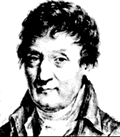|
Charles Law deals with the relationsip between the volume of a gas and its absolute temperature. |

Jacques Charles
|
Charles' law
He found that for a given number of moles of gas the volume of the gas is directly proportional to its temperature, provided the pressure is kept constant.
This may be expressed as:
This relationship can be explained by considering the effect that temperature has on the average kinetic energy of the gas particles. Increase the temperature and the particles increase in energy and speed. Collisions between particles force the gas apart and if the pressure is kept constant then the gas expands.
Charles' Law is useful for calculating the change in a gas volume under different temperature conditions. Gases are not usually dealt with under standard conditions and so this law allows correction for the current temperature.
Note: the temperature referred to is ALWAYS the absolute temperature in Kelvin, where 0 Kelvin = -273ºC.
Forgetting to change the temperature data into kelvin is a common mistake in calculations involving the gas laws.
|
Example: Calculate the volume occupied by 1 mole of gas at 35ºC at atmospheric pressure. At STP (273K, 1 atmosphere pressure) 1 mole of any gas occupies 22.7 dm3 According to Charles' Law:
New volume = 25.6 dm3 (3 sig. figs) |

